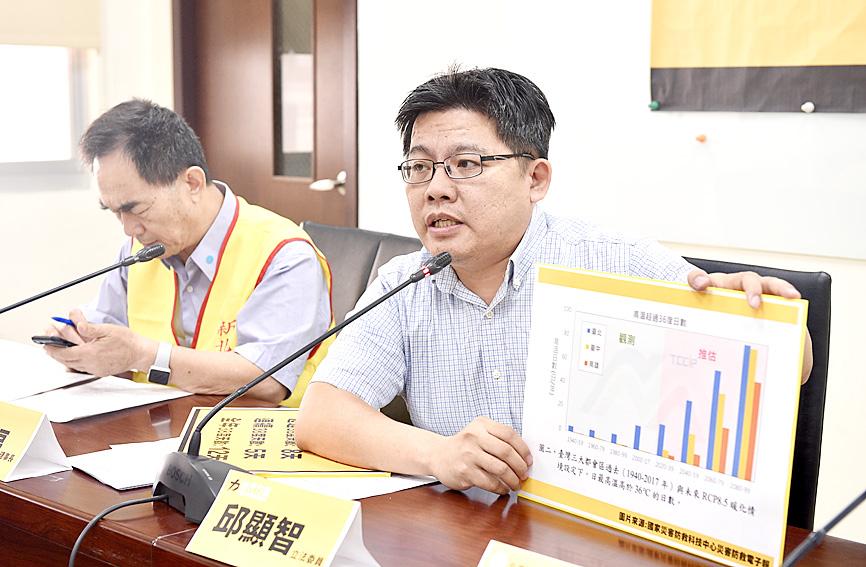New Power Party (NPP) Legislator Chiu Hsien-chih (邱顯智) yesterday asked the Ministry of Labor to set new rules to better protect workers from heat-related injuries, including rules for breaks on high-temperature days.
Citing data from the Central Weather Bureau, Chiu said that Taipei last month saw eight days with temperatures exceeding 38?C, adding that the city had already seen 12 such days earlier in the year.
According to the Ministry of Health and Welfare, 1,608 people sought emergency medical attention from May to July due to heat injuries, Chiu said, adding that this was the highest in a decade.

Photo: Peter Lo, Taipei Times
In July, 659 people with heat injuries were admitted to emergency rooms in 181 hospitals across the nation, which was 1.8 times higher year-on-year, he said.
Article 6 of the Occupational Safety and Health Act (職業安全衛生法) stipulates that employers must provide equipment and facilities to prevent workers from sustaining high-temperature related injuries, and those failing to do so could face fines of between NT$30,000 and NT$300,000, Chiu said.
Although the Ministry of Labor had conducted 2,225 labor inspections in outdoor work environments last year and found 1,217 cases where employers contravened the law, the ministry only issued penalties in one case, Chiu said, adding that the labor ministry in most cases just told employers to address the problems in a timely manner.
The current rules on labor management in high-temperature environments focus on indoor environments, such as factories, Chiu said, adding that the rules should be revised.
The labor ministry should also consider whether outdoor workers deserve more compensation, as they face greater health risks, he said.
New Taipei City Confederation of Trade Unions chairman Hung Ching-fu (洪清福) said that a majority of the accidents happen in the summer.
“Heat and humidity impedes workers’ reaction times. We think that workers should be given a break when the temperature is above 37?C, and those break times should be paid and included in their working hours,” said Hung, who works for Taiwan Power Co.

Taiwanese can file complaints with the Tourism Administration to report travel agencies if their activities caused termination of a person’s citizenship, Mainland Affairs Council Minister Chiu Chui-cheng (邱垂正) said yesterday, after a podcaster highlighted a case in which a person’s citizenship was canceled for receiving a single-use Chinese passport to enter Russia. The council is aware of incidents in which people who signed up through Chinese travel agencies for tours of Russia were told they could obtain Russian visas and fast-track border clearance, Chiu told reporters on the sidelines of an event in Taipei. However, the travel agencies actually applied

Japanese footwear brand Onitsuka Tiger today issued a public apology and said it has suspended an employee amid allegations that the staff member discriminated against a Vietnamese customer at its Taipei 101 store. Posting on the social media platform Threads yesterday, a user said that an employee at the store said that “those shoes are very expensive” when her friend, who is a migrant worker from Vietnam, asked for assistance. The employee then ignored her until she asked again, to which she replied: "We don't have a size 37." The post had amassed nearly 26,000 likes and 916 comments as of this

New measures aimed at making Taiwan more attractive to foreign professionals came into effect this month, the National Development Council said yesterday. Among the changes, international students at Taiwanese universities would be able to work in Taiwan without a work permit in the two years after they graduate, explainer materials provided by the council said. In addition, foreign nationals who graduated from one of the world’s top 200 universities within the past five years can also apply for a two-year open work permit. Previously, those graduates would have needed to apply for a work permit using point-based criteria or have a Taiwanese company

The Shilin District Prosecutors’ Office yesterday indicted two Taiwanese and issued a wanted notice for Pete Liu (劉作虎), founder of Shenzhen-based smartphone manufacturer OnePlus Technology Co (萬普拉斯科技), for allegedly contravening the Act Governing Relations Between the People of the Taiwan Area and the Mainland Area (臺灣地區與大陸地區人民關係條例) by poaching 70 engineers in Taiwan. Liu allegedly traveled to Taiwan at the end of 2014 and met with a Taiwanese man surnamed Lin (林) to discuss establishing a mobile software research and development (R&D) team in Taiwan, prosecutors said. Without approval from the government, Lin, following Liu’s instructions, recruited more than 70 software